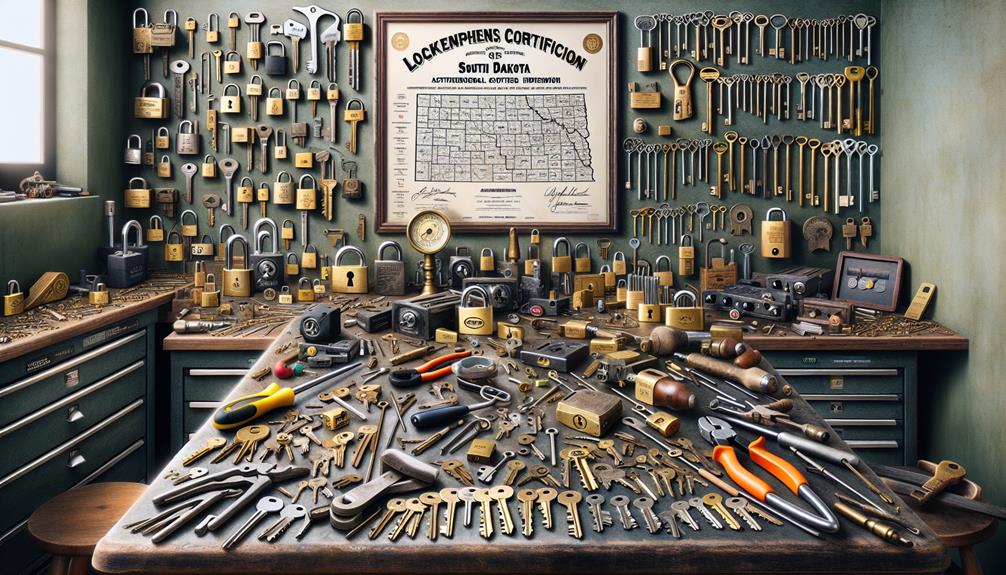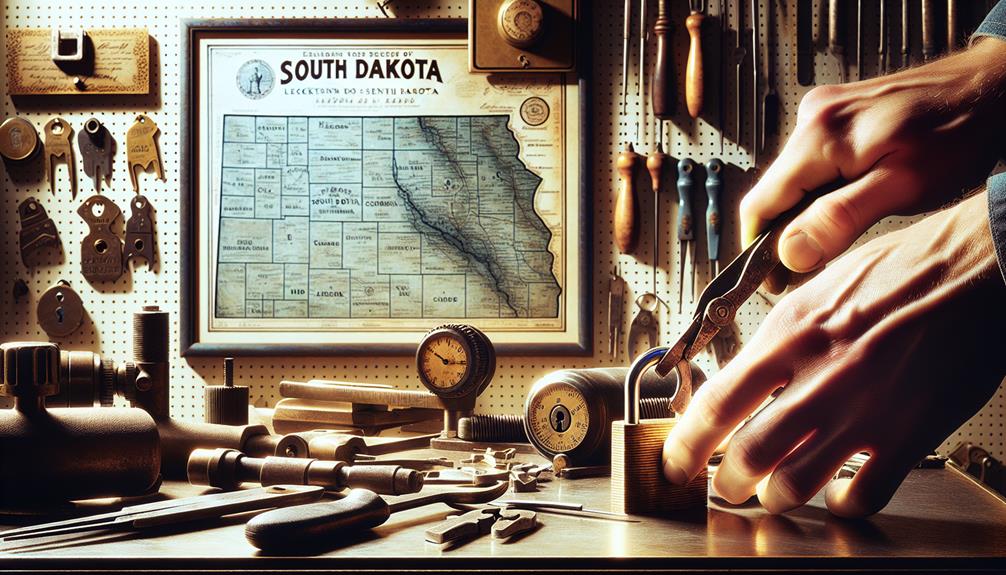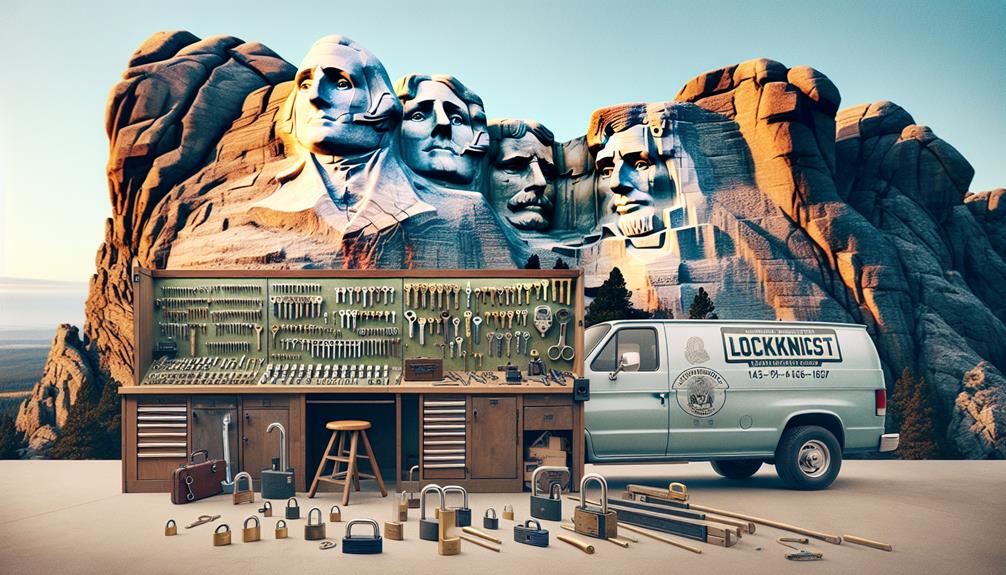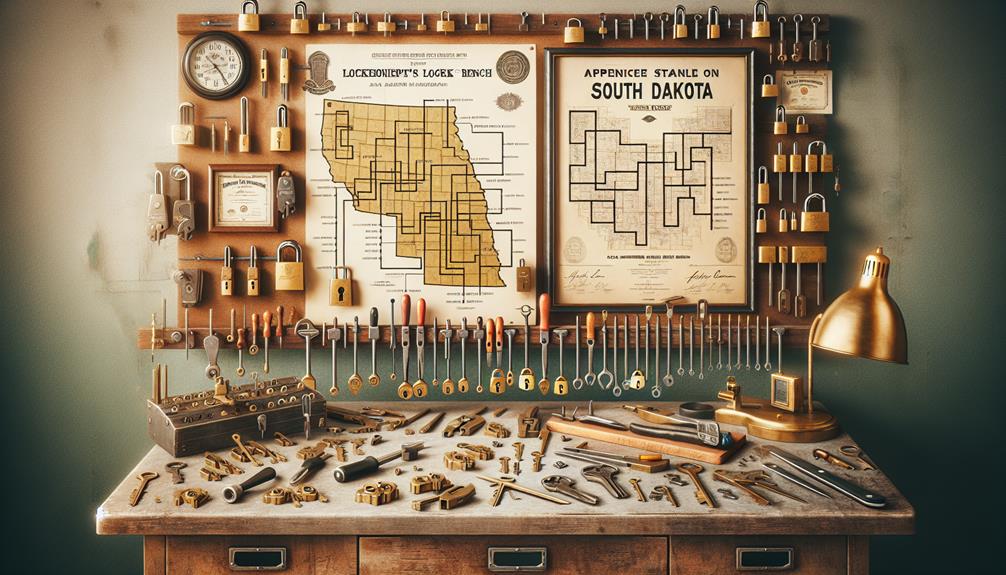Much like Harry Houdini, who was known for his skillful escapes, you’re about to embark on a career that involves unlocking the mysteries of tumblers and keys as a locksmith in South Dakota. It’s a profession where your adeptness can provide security and solace to those locked out of their homes or cars.
However, before you can start picking locks legally, there’s a toolkit of information you’ll need to assemble. While South Dakota doesn’t require locksmiths to hold a specific license, understanding the nuances of the trade, the potential income you could earn, and the type of training that will set you apart is essential.
And although the state’s rolling plains and quiet towns may suggest a slower pace, the demand for security measures is ever-present, ensuring that your services could be in high demand. Stay tuned to find out how you can turn this craft into a successful career, and what steps you should take to ensure your services are both reputable and profitable.
Key Takeaways
- Becoming a locksmith in South Dakota does not require a specific education degree or training certification.
- Locksmiths in South Dakota can start their own businesses with minimal investment and work from home or a mobile van.
- While there are no specific regulations or licensing requirements for locksmiths in South Dakota, a state-issued business license or a license issued by City Hall is necessary.
- Joining a reputable trade association can provide locksmiths with industry knowledge, support, and opportunities for continued education.
Understanding Locksmith Responsibilities

Locksmiths in South Dakota play a crucial role in ensuring the security of properties by providing services such as key creation, lock repair, and installation for residential, commercial, and automotive applications. You’ll find that the locksmith job requirements go beyond simple tasks and extend to an understanding of complex security systems.
To excel, you’ll need a diverse set of locksmith skills and qualifications that include a strong mechanical aptitude, precision, and problem-solving abilities.
As a budding locksmith, you’re expected to be adept at working with various tools and technologies. This includes the traditional lock-picking sets to the more advanced key programming devices. You must also be familiar with the latest security trends and be able to provide solutions that meet the unique needs of each client. Your role isn’t just about fixing locks, but also about offering peace of mind through enhanced security measures.
To succeed, you’ll need to be detail-oriented, possess excellent customer service skills, and have the ability to work under pressure. These qualifications won’t only help you tackle the day-to-day challenges but also build a reputation as a reliable and skilled locksmith in the ever-evolving South Dakota market.
Locksmith Training and Education

While mastering the fundamentals of mechanical locks and key creation sets a solid foundation, advancing in the locksmith profession in South Dakota requires comprehensive training and education to stay current with the latest security technologies. You’ll need to immerse yourself in both traditional locksmith apprenticeships and online locksmith training programs to hone your skills and knowledge.
Here’s a closer look at your training options in a clear and concise format:
| Training Option | Description | Duration |
|---|---|---|
| Locksmith Apprenticeships | Hands-on experience under a professional locksmith’s guidance | Typically 1-3 years |
| Online Locksmith Training | Theoretical and practical skills through web-based courses | Varies (self-paced) |
| Continuing Education Courses | Advanced classes on the latest security technology | Short courses (days-weeks) |
Locksmith apprenticeships offer the invaluable experience of working with seasoned professionals, giving you a real-world understanding of the trade. Meanwhile, online locksmith training programs provide flexibility and a broad curriculum, ranging from basic techniques to complex security systems.
Starting a Locksmith Business

Embarking on the journey of starting your own locksmith business in South Dakota requires careful planning and a strategic approach to ensure success in this competitive industry. As you’re setting up your enterprise, it’s crucial to focus on robust marketing strategies that will differentiate your services and attract a steady stream of customers.
Crafting an effective marketing plan is integral for customer acquisition. It should encompass both traditional methods such as networking with local businesses and contemporary digital tactics, including a user-friendly website and active social media presence. You’ll want to leverage search engine optimization (SEO) to increase your visibility online, ensuring that when potential customers search for locksmith services in South Dakota, your business comes up first.
Don’t underestimate the power of word-of-mouth; providing excellent service can lead to referrals, which are gold in this trade. Meanwhile, consider running targeted advertising campaigns in local media and online platforms to reach a broader audience.
Advancing Your Locksmith Career

To advance your career as a locksmith in South Dakota, you’ll need to embrace continuous learning and seek out opportunities that expand your expertise and service offerings. Advancing locksmith skills isn’t just about staying current with the basics; it’s about pushing beyond them. You should consider specializing in areas like electronic security systems, safe work, or advanced automotive locksmithing. These niches can set you apart and provide a competitive edge.
Locksmith career growth opportunities often come from networking within the industry. Join local trade associations, attend workshops, and connect with other locksmiths. Sharing knowledge and experience can lead to collaborative projects and referrals, which can broaden your customer base and increase your earning potential.
Certifications play a crucial role in showcasing your commitment to excellence. By obtaining certifications such as Certified Professional Locksmith (CPL) or Certified Master Locksmith (CML), you demonstrate a higher level of proficiency that customers trust. Invest in these certifications to highlight your dedication to the craft and to provide assurance to clients that they’re in capable hands.
Locksmith Salary and Prospects

As you hone your skills and acquire certifications to advance your locksmith career in South Dakota, it’s equally important to understand the financial prospects and salary expectations that come with this trade. The locksmith job market can vary, with factors like location, experience, and the level of expertise playing a significant role in determining your potential earnings.
To give you a clearer picture of what to expect, consider these insights:
- Average Earnings: Locksmiths in South Dakota typically earn salaries that reflect the cost of living in the region, with average earnings being competitive within the trade industry.
- Job Outlook: The locksmith job outlook remains stable, as security concerns and the need for lock upgrades and maintenance continue to drive demand for skilled professionals.
- Advancement Potential: With experience and continued education, you can specialize in areas such as forensic locksmithing or advanced security solutions, potentially increasing your earning capacity.
The locksmith industry is one where experience and reputation can significantly enhance your financial success. Staying informed and adaptable to the changes in security technology will place you in a favorable position within the locksmith job market, ensuring your services remain in demand.
Frequently Asked Questions
What Specific Legal Considerations Should I Be Aware of When Operating as a Locksmith in South Dakota Regarding Customer Privacy and Property Access?
You should prioritize locksmith ethics and data protection while operating in South Dakota. Respect customers’ privacy, only accessing property legally and ethically. Don’t disclose personal information or security details.
It’s vital to safeguard data and keys you handle. Stay informed on privacy laws to ensure compliance. Upholding these principles not only protects your clients but also enhances your reputation as a trustworthy professional.
Can a Locksmith in South Dakota Specialize in a Particular Area Such as Automotive or Electronic Security Systems, and What Additional Training Would Be Required?
Imagine mastering lock picking techniques, transforming you into a sought-after specialist.
In South Dakota, you can indeed focus on areas like automotive or electronic security systems.
You’ll need to dive deeper into key cutting advancements and the specific tech involved.
Pursue additional training through specialized courses or certifications to hone these skills.
Your expertise won’t only set you apart but also unlock new opportunities in your career.
How Does the Lack of State-Specific Licensing in South Dakota Impact the Credibility and Trustworthiness of Locksmiths in the Eyes of Potential Customers?
In South Dakota, the absence of state-specific licensing for locksmiths can heighten customer skepticism. You’ll need to focus on reputation building to gain trust.
Join professional associations, earn certifications, and collect customer testimonials. Show your expertise and reliability through quality service and transparent practices.
Your credibility is built on word-of-mouth and the professional image you cultivate, assuring customers they’re in safe hands despite the lack of formal state licensing.
What Are Some Common Challenges Faced by Locksmiths in South Dakota Due to Weather Conditions or Rural Service Areas, and How Can They Be Mitigated?
You think braving extreme temperatures is just about layering up? Try picking a lock when your fingers are icicles. Locksmiths in South Dakota face the frosty challenge of working in frigid conditions and handling travel logistics across vast rural areas.
Mitigate these issues by investing in reliable transportation and quality cold-weather gear. Stay ahead of the game with remote services when possible, and always keep a hot coffee thermos handy.
Are There Any Specific Insurance Policies That Locksmiths in South Dakota Should Consider to Protect Their Business From Liability, and How Do They Differ From General Business Insurance?
You should consider tailored insurance policies that offer specific business coverage for locksmith activities.
A thorough risk assessment will determine the extent of liability protection you’ll need.
These policies differ from general business insurance by addressing the unique risks of locksmithing, such as accidental damage to a client’s property or loss of their keys.
It’s crucial to ensure you’re fully protected to avoid costly mishaps.








